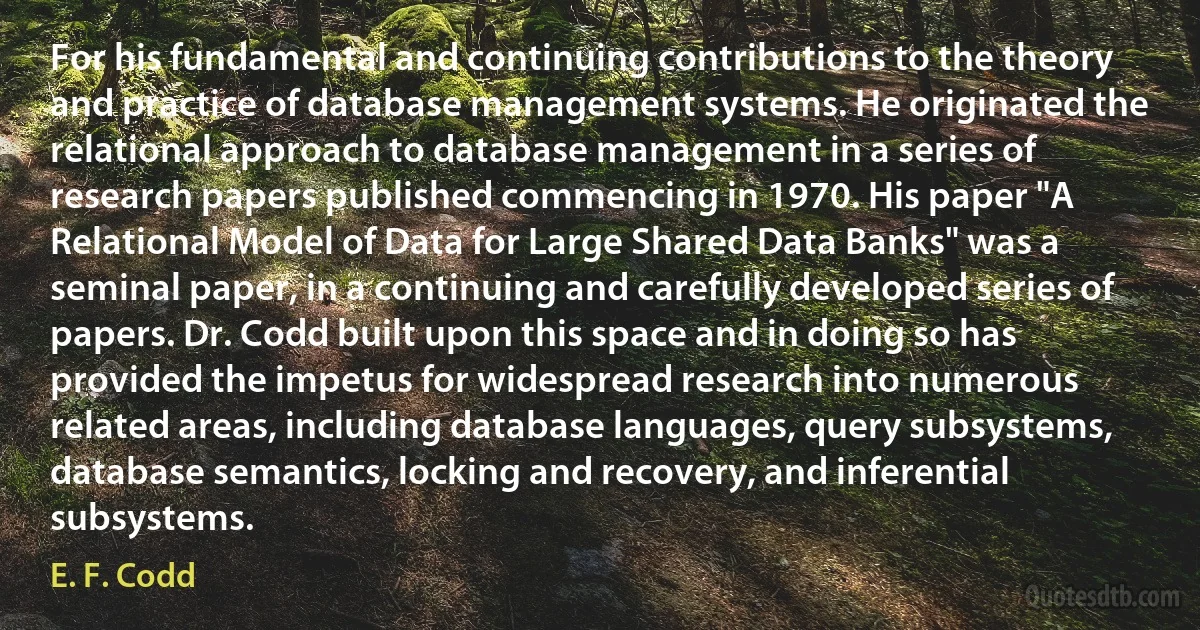
For his fundamental and continuing contributions to the theory and practice of database management systems. He originated the relational approach to database management in a series of research papers published commencing in 1970. His paper "A Relational Model of Data for Large Shared Data Banks" was a seminal paper, in a continuing and carefully developed series of papers. Dr. Codd built upon this space and in doing so has provided the impetus for widespread research into numerous related areas, including database languages, query subsystems, database semantics, locking and recovery, and inferential subsystems.
E. F. CoddRelated topics
approach built datum fundamental impetus large model paper practice query recovery research seminal series space semantics databaseRelated quotes
It is clear, then, that the idea of a fixed method, or of a fixed theory or rationality, rests on too naive a view of man and his social surroundings. To those who look at the rich material provided by history, and who are not intent on impoverishing it in order to please their lower instincts, their craving for intellectual security in the form of clarity, precision, "objectivity", "truth", it will become clear that there is only one principle that can be defended under all circumstances and in all stages of human development. It is the principle: anything goes.

Paul Karl Feyerabend
In the course of waging that war, the people of Canada had shown that it was possible for them to maintain nearly a million men in uniform and at the same time expand all the facilities for production within Canada at an unprecedented speed, including building industries which had never existed in Canada before... and by and large the cost of production in Canada compared favourable with the cost of production anywhere else among the Allies... All of this was accomplished without any foreign investment, without and foreign loans... We were quite capable of self-development.

Tim Buck
It is worth remembering that every writer begins with a naively physical notion of what art is. A book for him or her is not an expression or a series of expressions, but literally a volume, a prism with six rectangular sides made of thin sheets of papers which should include a cover, an inside cover, an epigraph in italics, a preface, nine or ten parts with some verses at the beginning, a table of contents, an ex libris with an hourglass and a Latin phrase, a brief list of errata, some blank pages, a colophon and a publication notice: objects that are known to constitute the art of writing.

Jorge Luis Borges
In 1800 he had published his momentous discovery of infra-red rays; and in 1803 and 1804 his re-examination of double stars would reveal examples where the two components had orbited each other, visual proof that attractive forces...operated outside the solar system. ...between 1811 and 1818 he published four great synthetic papers on the construction of the heavens, in which he expounded the life-story of nebulae and clusters as they developed over time under the influence of gravity. ...Soon, development over time-in contrast to the unchanging clockwork universe of Newton and Leibniz-would become and remain part of astronomical thinking.

William Herschel
Cultural theory as we have it promises to grapple with some fundamental problems, but on the whole fails to deliver. It has been shamefaced about morality and metaphysics, embarrassed about love, biology, religion and revolution, largely silent about evil, reticent about death and suffering, dogmatic about essences, universals and foundations, and superficial about truth, objectivity and disinterestedness. This, on any estimate, is rather a large slice of human existence to fall down on. It is also, as we have suggested before, rather an awkward moment in history to find oneself with little or nothing to say about such fundamental questions.

Terry Eagleton
